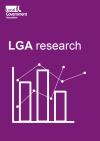View all Research articles
Background
From May 2022 to September 2022 the Local Government Association (LGA) conducted a survey across all 322 councils in England and Wales. Currently, under the London Local Authorities and Transport for London Act 2003, London boroughs can apply Fixed Penalty Notices (FPNs) to offenders who are involved in certain highways obstruction offences, such as unlicensed skips and wilful obstruction of the highways. However, all councils outside of London do not have the power to issue FPNs. The purpose of the survey was to capture the views of councils outside of London see whether they would benefit from having the same powers as London boroughs in order to deal with these types of offences. A total of 74 responses were received (23 per cent).
Key findings
- Use of FPNs: Ninety-two per cent, or 68 of the 74, councils which responded said they would use FPNs if given the same powers as London boroughs.
- Use of FPNs: Ninety-three per cent, or 69 of the 74 councils, which responded said they would use FPNs for the obstruction of roads.
- Eighty-eight per cent, or 65 of the 74 councils, who responded said they would use FPNs for Safety or Unlicensed skips.
- Eighty-five per cent, or 63 of the 74, councils who responded said they would use FPNs for those who fail to comply with regulations.
- Eighty per cent, or 59 of the 74 councils, who responded said they would FPNs for the careless depositing of materials on the roadside.
- Seventy-six per cent, or 56 of the 74 councils, said they would use FPNs to prevent impacting visibility for motorists and cyclists.
- Court time: The majority of councils (85 per cent) agreed that a lack of time and resources deters local authorities from issuing warning letters and taking offenders to court. >/li>
- Benefits of FPNs: Seventy-six per cent, or 56 of the 74, councils said that a more proportionate level of enforcement action would be one of the main benefits of issuing FPNs.
- Seventy-three per cent, or 54 of the 74, councils said that accelerating enforcement action would be one of the main benefits of issuing FPNs.
- Seventy per cent, or 52 of the 74, councils said that an increase of public confidence would be one of the main benefits of issuing FPNs.
- Sixty per cent, or 44 of the 74, councils said that reducing the need for costly legal action would be one of the main benefits of issuing FPNs.
- Fifty-eight per cent, or 43 of the 74, councils said that increasing officer efficiency would be one of the main benefits of issuing FPNs.
- Issuing FPNs: Fifty-seven per cent, or 42 of the 74, respondent councils said that the power to issue FPNs should sit within single tier, county, and district councils, whilst 35 per cent, or 26 of the 74 councils, said that the power to issue FPNs should sit with single tier and county councils.

- Published by:
-
LGA
- Reference code:
